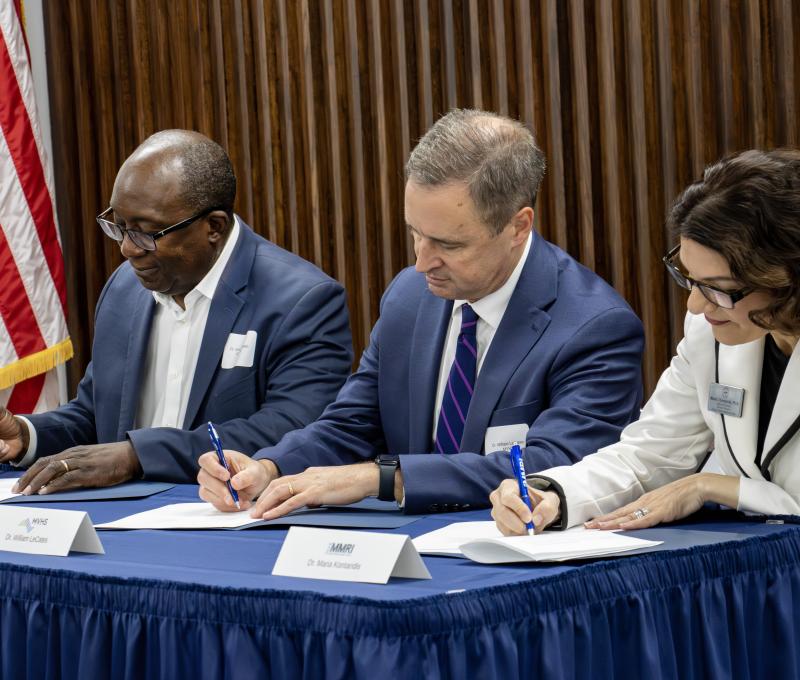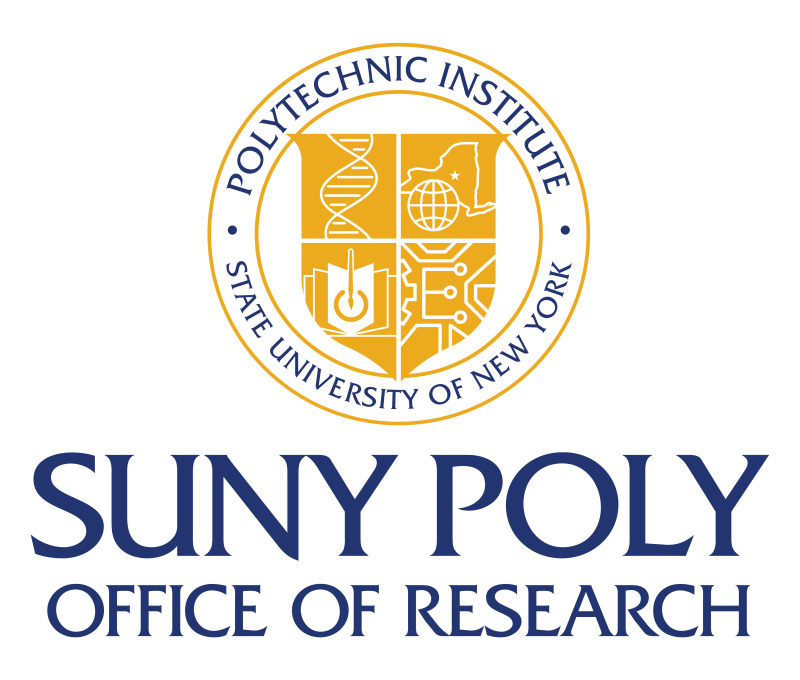National Science Foundation Awards Newly Merged CNSE/SUNYIT
Faculty
$100,000 Research Grant

Utica, NY – The newly merged SUNY College of Nanoscale Science and Engineering (CNSE) / SUNY Institute of Technology (SUNYIT) today announced Yu Zhou, Associate Professor of Mechanical Engineering, has been awarded a $100,000 research grant by the National Science Foundation. The grant was awarded for his project entitled “GOALI/Collaborative Research: Fundamental Study of Impacts of Manufacturing Processes and Automation on Material Properties of Composite Products.”
“This funding recognizes the national importance of Dr. Zhou’s groundbreaking research, and all of us at the newly merged CNSE/SUNYIT congratulate him for this achievement,” said Dr. Robert Geer, Senior Vice President and Chief Operating Officer of the newly merged CNSE/SUNYIT institution. “Our faculty are second to none in their commitment to excellence as they explore innovation in the laboratory and classroom that will launch 21st-century careers for our students.”
“As he completes his first year as a member of the faculty, I’m pleased that Dr. Zhou’s research efforts are receiving this important recognition and validation,” said William W. Durgin, CNSE/SUNYIT Provost. “This is a perfect example of the outstanding work our faculty are doing in a wide range of disciplines. I join Dr. Zhou’s colleagues in congratulating him.”
Zhou’s research will focus on fiber-reinforced polymer composites, which, due to their high stiffness and strength-to-weight ratio, are attracting increasing global interest from industries including transportation, marine, wind, energy, aerospace and construction. Composites can be found in a wide range of products, including automobile parts, high-performance sporting equipment and even the Space Shuttle. To meet growing market demands, manufacturing of composites needs to move from conventional, labor-intensive processes toward flexible automation. Zhou and his team will look at the impacts of process parameters on manufacturing-induced defects and final product quality, which ultimately will create significant benefits for small and medium-size manufacturers.
“Our research will assist the U.S. manufacturing sector and protect the outsourcing of the majority of projected composite-based jobs to overseas markets with cheap labor,” Zhou said. “We hope to impact the composite manufacturing industry by providing the first-ever comprehensive capability of quantitative analysis and on-line control to a wide range of composite manufacturing processes, and by providing small and intermediate manufacturers an automated and cost-effective solution to produce composite parts in large volumes.”
“Dr. Zhou is a tremendous asset to our institution and a valuable resource for our students,” said F. Andrew Wolfe, Chair of the Department of Engineering, Science and Mathematics at CNSE/SUNYIT’s Utica campus. “In exploring cutting-edge solutions to real-world problems, his research connects our students in the classrooms and labs of today with the future workplaces in which they will find success.”
Zhou, who joined the faculty in the Department of Engineering, Science and Mathematics at CNSE/SUNYIT’s Utica campus in 2013, earned a Ph.D. in Mechanical Engineering from Johns Hopkins University. His research portfolio includes robot motion planning, sensing and control and development of various robotic devices and automatic systems.
#################### About SUNY CNSE. The SUNY College of Nanoscale Science and Engineering (CNSE) is the world leader in the emerging disciplines of nanoscience, nanoengineering, nanobioscience, and nanoeconomics. CNSE represents the world’s most advanced university-driven research enterprise, with more than $20 billion in high-tech investments and over 300 corporate partners. The 1.3 million-square-foot Albany NanoTech megaplex is home to more than 3,100 scientists, researchers, engineers, students, and faculty. CNSE maintains a statewide footprint, operating the Smart Cities Technology Innovation Center (SCiTI) at Kiernan Plaza in Albany, the Solar Energy Development Center in Halfmoon, the Photovoltaic Manufacturing and Technology Development Facility in Rochester, and the Smart System Technology and Commercialization Center (STC) in Canandaigua. CNSE co-founded and manages the Computer Chip Commercialization Center (Quad-C) at SUNYIT and is lead developer of the Marcy Nanocenter site in Utica, as well as the Buffalo High-Tech Manufacturing Complex, Buffalo Information Technologies Innovation and Commercialization Hub, and Medical Innovation and Commercialization Hub. For information, visit www.sunycnse.com.
About SUNYIT. SUNYIT, the State University of New York Institute of Technology at Utica/Rome, is New York’s public polytechnic, offering undergraduate and graduate degree programs in technology, professional studies, and the arts and sciences. Its academic offerings in technology include engineering, cybersecurity, computer science, and the engineering technologies; programs in professional studies include business, communication, and nursing; and offerings in the arts and sciences range from sciences to humanities to the social sciences. Athletics, recreational, cultural and campus life programs, events and activities complement the academic experience. Founded in 1966, SUNYIT is a unique high-tech learning environment on hundreds of acres, offering degree programs online as well as on campus. The SUNYIT family of alumni now numbers 25,000. For information, visit www.sunyit.edu.
####
Media Contact:
Jerry Gretzinger, VP of Strategic Communications and Public Relations (518) 956-7359 | ggretzinger@albany.edu








